

Nov. 30, 2006: My Dinner with Dennison
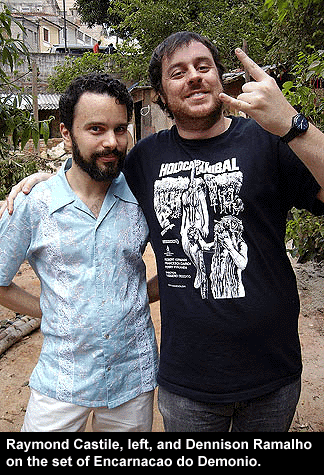 The shoot breaks for two days. There are
laws stipulating they must take a day off every six days, so they
cannot shoot today (Thursday). On Saturday, they will shift from
night to daylight shooting. The law says they must take a day off
between switching from night to day schedules, so they cannot shoot
Friday. What am I going to do the next two days? Stare at
the walls? I can do that in Missouri. I need to find a way
to take advantage of my time.
The shoot breaks for two days. There are
laws stipulating they must take a day off every six days, so they
cannot shoot today (Thursday). On Saturday, they will shift from
night to daylight shooting. The law says they must take a day off
between switching from night to day schedules, so they cannot shoot
Friday. What am I going to do the next two days? Stare at
the walls? I can do that in Missouri. I need to find a way
to take advantage of my time.That is difficult when you slumber the day away. It must have been 7 a.m. before I finally fell asleep. I woke up around 4 p.m. I take a shower, do some exercises, walk to Bella Paulista and drink some coconut milk, walk back to the hotel and stare at the walls. My iPod keeps me company.
Dennison Ramalho calls around 7 p.m. and tells me we are going to dinner at 11 p.m. Why so late? Because his wife is a costume designer for a theatrical stage production and this is the show’s final night, so he has to be with her and her theater friends much of the evening. He thinks some of the theater people will join us for dinner, but he and I will sit to the side and discuss “more pleasant matters,” like horror movies.
Earlier in the week, Dennison told me he grew up watching Hammer films on Brazilian television. His favorite Hammer is The Devil Rides Out. I tell him mine is Curse of the Werewolf. He loves Dennis Wheatley, and finds it amusing that the British novelist equated Socialism with Satanism. I am not sure about Dennison’s religious beliefs. He is fascinated with the occult, as am I. But he is a very decent person, bordering on square, as am I.
One of his favorite directors is Mario Bava. Here again, we have common ground. His favorite Bava film is Rabid Dogs, one of the few Bava films I have not seen. My favorite is Planet of the Vampires. We agree that a true connoisseur must not, under any circumstances, reveal that his favorite Bava is Black Sunday.
Dennison loves the Something Weird video company. He urges me to buy the Something Weird DVD of Satanis, a documentary about Anton LeVey’s Church of Satan. It is one of the films that inspired his award-winning short subject, Love for Mother Only. He has great respect for Mike Vraney, who runs Something Weird.
He talks fondly of two films that seem to come from another dimension: Incubus with William Shatner, and Begotten by director E. Elias Merhige. I’ve seen Incubus, but not Begotten.
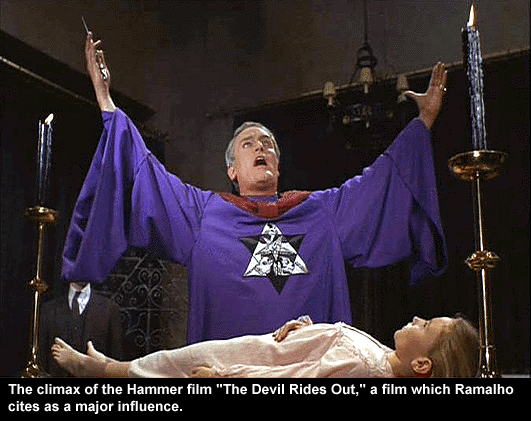 All of the above is from our conversations in the studio lunchroom. Now for tonight’s dinner.
All of the above is from our conversations in the studio lunchroom. Now for tonight’s dinner.I step out of the elevator and see Dennison watching the TV in the hotel lobby. He swings around and greets me. He is wearing a Cannibal Holocaust T-shirt. I tell him I like Cannibal Holocaust, even though I’m a vegetarian. This impresses him so much that he repeats it to his wife when we reach the car outside.
His wife is statuesque and elegant. At first glance, it might seem strange that she is married to this scrappy horror fan in his Cannibal Holocaust shirt. But once they start interacting, it is clear they are made for each other. They make a cute couple.
Dennison gives me a gift. It is a Ze do Caixao T-shirt by fashion designer Alexandre Herchcovitch, who is designing the costumes for Encarnacao. I have been searching two years for one of these shirts, ever since I read about Herchcovitch basing his 2004 collection on Ze do Caixao and saw photos of his runway show on a fashion Web site. Herchcovitch is one of the rising stars of the fashion world. He also happens to be a Coffin Joe fan. Getting him to design the costumes for Encarnacao is quite a coup. Anyway, I finally have one of these Ze shirts. It is used, but in good shape. That’s fine. It was a limited edition and is now impossible to find. I have been searching on ebay and have not seen one in two years.
Dennison says I can pick out a skull from the set as a souvenir, if I want. I tell him I would rather have a set of resin fingernails. He tells me he will talk to the makeup effects director, Andre, who will be having dinner with us. But instead of asking him over dinner, he will wait for the right moment to approach him on the set. I surmise that giving away a set of nails is kind of sensitive, like Paramount giving away a set of Spock’s ears. But Dennison thinks he can work it out.
We pick up Andre and go to an Italian pizzeria. This is no ordinary pizza joint. It is a stylish Italian restaurant known for its unique pizzas. We order a bottle of Chilean red wine and two pizzas. One is covered with some kind of tangy relish, topped with globs of garlic cream. The other is topped with sliced zucchini and squares of a different kind of garlic cream. These yellow squares are more like butter, whereas the white globs on the other pizza are more like sour cream. Both the pizzas are delicious. Being a light eater, it’s been a long time since I’ve eaten real, hearty pizza.
(Thankfully, the theater people do not accompany us. It is just Dennison, his wife, Andre and me.)

 Dennison tells me stories about Mojica. About 10 years ago,
Dennison began “bugging” Mojica at his office, trying to
pick his brain about filmmaking. The two formed a relationship
and Dennison became his protégé. I knew that Mojica
had not directed a feature film in 20 years, so I asked if Mojica kept
an office and fulltime staff. Dennison said, yes, he’s
always kept his office building open and operating. If he
wasn’t making movies, why did he need an office? Because
Mojica makes his living through a trio of “quasi-artistic
pursuits.” He runs an acting workshop out of the
building. His acting workshop
is usually full. I tell him I’ve seen footage from the
acting workshop on the Brazilian six-disc Coffin Joe DVD set.
Dennison is impressed that I own this set, which is now
out-of-print.
Dennison tells me stories about Mojica. About 10 years ago,
Dennison began “bugging” Mojica at his office, trying to
pick his brain about filmmaking. The two formed a relationship
and Dennison became his protégé. I knew that Mojica
had not directed a feature film in 20 years, so I asked if Mojica kept
an office and fulltime staff. Dennison said, yes, he’s
always kept his office building open and operating. If he
wasn’t making movies, why did he need an office? Because
Mojica makes his living through a trio of “quasi-artistic
pursuits.” He runs an acting workshop out of the
building. His acting workshop
is usually full. I tell him I’ve seen footage from the
acting workshop on the Brazilian six-disc Coffin Joe DVD set.
Dennison is impressed that I own this set, which is now
out-of-print.Mojica also contracts with the government to train detectives. Coffin Joe teaching a detective school? Yes, he trains them to act for undercover work. Now that is interesting.
His third enterprise is a talent agency, mostly for models who have been rejected by the bigger agencies. (I think it is Cro who later explains to me that the agency is more like what we would call a union in the U.S. You cannot get work in film, TV or modeling in Brazil without a certificate saying you have agency representation. If there is a problem with pay or working conditions, the agency works to straighten it out. I tell him that, yes, this is what a union would do in the U.S. Mojica’s agency is called the Ze do Caixao agency. When they are hired, his clients present a document stating they belong to Ze do Caixao. Would you dare mistreat an employee represented by a union run by Ze do Caixao?)
Dennison tells me about Mojica’s penchant for spinning “phantasmagorical tales.” He means tall tales. Mojica is quite the raconteur. Dennison said you can tell whether a story is true or false by the number of times Mojica tells it. For instance, he told one or two interviewers that there is a tribe in southern Brazil that worships Ze do Caixao. They have the character’s image tattooed on their breasts and buttocks. Of course this is not true, Dennison says. You can tell that it is false because Mojica has only told the story once or twice.
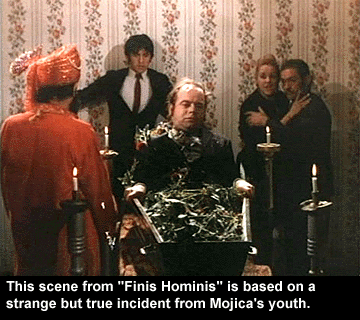 I ask him if it is true that Mojica, as a child, saw a man “rise
from the dead.” Mojica tells a story about a man in his
hometown who apparently died, then rose from his coffin during the
funeral. The man had been in a cataleptic state. Afterward,
his wife left him and the townspeople shunned him. They thought
he must be in league with the devil.
I ask him if it is true that Mojica, as a child, saw a man “rise
from the dead.” Mojica tells a story about a man in his
hometown who apparently died, then rose from his coffin during the
funeral. The man had been in a cataleptic state. Afterward,
his wife left him and the townspeople shunned him. They thought
he must be in league with the devil.Dennison says he believes this story is true, because Mojica has told it many times. Mojica put the experience in his film, Finis Hominis.
Then Dennison tells me that I have become one of Mojica’s stories! Mojica has told reporters that there is a young man in America who dresses up like him. “But you are one of his true stories,” Dennison says.
Speaking of reporters, I can thank newspapers for bringing me to Mojica’s attention. At least one paper, maybe two, printed photos of me to illustrate interviews with Mojica. They probably Googled “Ze do Caixao,” found my page and assumed the photos were Mojica. My site is in English, so a Portuguese-speaking journalist or editor would not have realized the mistake. Mojica saw these photos in print and wondered where they came from. He didn’t remember taking them. Dennison found my site and explained to Mojica that the photos were not of him, but an American fan. Mojica was astounded. He honestly thought he was looking at photos of himself.
Dennison says the cultural elite look down on Mojica, but the public loves him because he is something rare in Brazil – a populist filmmaker. Most Brazilian cinema is intellectual or political. Mojica’s films are entertaining. Dennison calls Mojica Brazil’s only “pop culture filmmaker.”
(Interestingly, Cro takes a different angle on his father’s work. Cro says one of the special things about Mojica’s place in Brazilian culture is that appreciation for his films transcends social/economic class boundaries. The rich and poor, educated and illiterate, all enjoy his films. Also, one of the things that makes Mojica’s films stand out is that they are not merely entertainment. Mojica insists that every film must explore a philosophical idea.)
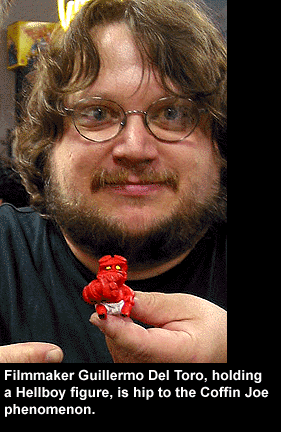 For a long time, Mojica’s films were unavailable in Brazil.
Dennison saw many of them on bootleg videotapes during the 1980s and
early 90s. When they began gaining notoriety in the United States
and Europe, Mojica’s reputation began to grow in his own
country. His current standing is evidenced by the fact that the
Brazilian government is financing Encarnacao do
Demonio. The government finances short subjects, like
Dennison’s own Love for Mother Only, and "respectable" feature films, but not horror movies. “Mojica is the only
filmmaker who has received government financing (to make a horror feature) because he is the only one who has
the credibility to do so,” Dennison says.
For a long time, Mojica’s films were unavailable in Brazil.
Dennison saw many of them on bootleg videotapes during the 1980s and
early 90s. When they began gaining notoriety in the United States
and Europe, Mojica’s reputation began to grow in his own
country. His current standing is evidenced by the fact that the
Brazilian government is financing Encarnacao do
Demonio. The government finances short subjects, like
Dennison’s own Love for Mother Only, and "respectable" feature films, but not horror movies. “Mojica is the only
filmmaker who has received government financing (to make a horror feature) because he is the only one who has
the credibility to do so,” Dennison says.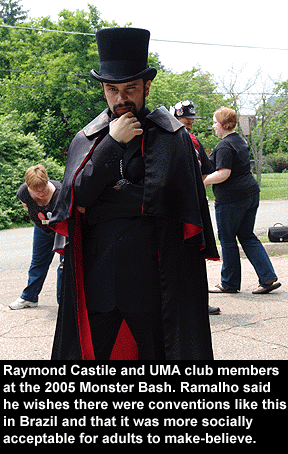 But Dennison is frustrated that Mojica’s fame does not seem to
have spread to Hollywood. A few months ago, he spent several
weeks in Los Angeles and had 32 meetings with Hollywood
executives. (Dennison has been receiving offers to direct feature
films, like the proposed remake of Hell House.) He found only two
people familiar with Coffin Joe – a Universal Studios vice
president and director Guillermo Del Toro.
But Dennison is frustrated that Mojica’s fame does not seem to
have spread to Hollywood. A few months ago, he spent several
weeks in Los Angeles and had 32 meetings with Hollywood
executives. (Dennison has been receiving offers to direct feature
films, like the proposed remake of Hell House.) He found only two
people familiar with Coffin Joe – a Universal Studios vice
president and director Guillermo Del Toro.I told him Hollywood is always the last to catch on to something cool. The studio execs live in a bubble. They have tunnel vision. Innovation has to come from the outside, then Hollywood jumps on the bandwagon. Usually a day late and a dollar short. Dennison agrees. But since they are looking for Hollywood distribution for “Encarnacao,” this realization was unsettling. He returned from Hollywood somewhat disillusioned.
One of the best things to come from his trip was a budding friendship with Del Toro. The director invited Dennison to accompany him to Comic Con in San Diego. The convention was an eye-opening experience. I tell him I never used to go to fantasy conventions, but now I go to two or three a year. He shakes his head in amazement. Two or three a year! He said he wished he could attend even one a year. (If any of his movie deals pan out, I’m sure that will no longer be a problem!)
When Dennison asked why I made my Coffin Joe costume, I tell him I just did it for fun. He says that is one of the things about American culture that he envies. You can have fun and be imaginative, no matter how old you are. He saw that firsthand at Comic Con.
In Brazilian culture, you are expected to grow up fast, get a job, make money, raise a family. As an adult, you are supposed to let go of the joys of your youth. I tell him it is very similar in Egypt, where my mother’s side of the family live. People grow up fast. There is not a lot of mirth. The idea of dressing up like movie characters and going to conventions is totally alien.
Andre says it is not as bleak as Dennison makes it out to be. There is room for fantasy in Brazil. There are opportunities to dress up and have fun. There is a culture of Brazilian fandom. The fact that he and Dennison are working on this horror film is proof.
“But you know as well as I that there is a part of society that looks down on people like us,” Dennison tells him.
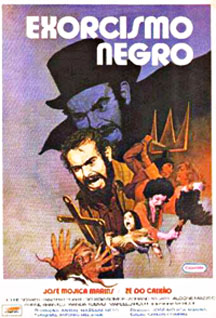 Our conversation turns to the hunt for memorabilia. Dennison says
one of his proudest positions is an Exorcismo Negro movie
poster, signed by the artist who designed it. Exorcismo
Negro (aka The Bloody Exorcism of Coffin Joe) is
considered one of Mojica’s weakest films, Dennison says, but he
actually likes it. In fact, he likes it a lot. It was one
of his inspirations for Love for Mother Only.
Our conversation turns to the hunt for memorabilia. Dennison says
one of his proudest positions is an Exorcismo Negro movie
poster, signed by the artist who designed it. Exorcismo
Negro (aka The Bloody Exorcism of Coffin Joe) is
considered one of Mojica’s weakest films, Dennison says, but he
actually likes it. In fact, he likes it a lot. It was one
of his inspirations for Love for Mother Only.I tell him I am jealous that he has that poster. I have been searching and searching for Coffin Joe movie posters, but to no avail. Where do I go to find something like that? He says you can’t find them. Mojica’s movie posters are impossible to find. Even Mojica does not have examples of many of them. Dennison lucked into the Exorcismo Negro poster, which was discovered in bad condition in the bottom of a box of junk. He had it professionally restored. He has hunted for more Mojica posters, but has come up short. There is a bar that has a poster for Delirios de um Amoral (Hallucinations of a Deranged Mind) hanging on its wall. He offered the bar owner R$200, but was turned down. There is also a night club that has another Mojica poster hanging in it. I think it is This Night I Will Possess Your Corpse. I think Dennison also tried to buy that one, but was turned down. He is unaware of any shop or dealer that would be able to procure vintage Ze do Caixao movie posters.
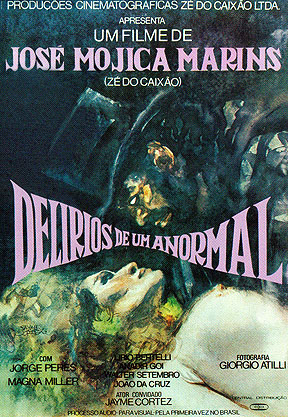 “So, even in Brazil, you cannot find Coffin Joe posters,” I tell him.
“So, even in Brazil, you cannot find Coffin Joe posters,” I tell him.Dennison and his wife become very interested in my statement. They want me to explain the meaning of the word “even.” It is obvious that this is something they have discussed before, something they have been wondering about for a long time.
I cannot come up with a definition, so I use an example. “Even if Dennison reached across the table and punched me, I would still think he was a good guy,” I say.
Ah! They look at each other excitedly. The mystery is solved. Dennison repeats the sentence, “EVEN in Brazil, you cannot find the posters.” Now he understands how to use the word “even.”
I see that his wife is not wearing a wedding ring. Neither is Dennison. His wife raises her hands. “No,” she says, grinning. “No ring!”
Dennison explains that they are not really married. They have lived together two years. In Brazil, when you live together, you say you are married.
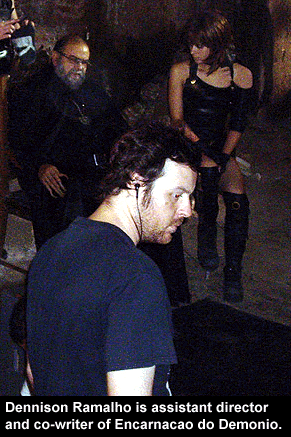 Being a health food nut, I never eat dessert. Tonight, I make an exception. Dennison insists.
Being a health food nut, I never eat dessert. Tonight, I make an exception. Dennison insists.We share a platter of fancy flavored ice cream (probably gelato). The scoops are arranged in circular fashion surrounding a center bowl filled with a strange, red, gelatinous substance.
“Try it. You will not believe what it is,” Dennison says.
I try the red goo. It tastes delicious, like pumpkin pie spice. I cannot guess what it is.
His wife says, “It’s tomato jelly!”
Now I can taste the tomato. What an unusual flavor. I ask if this is a Brazilian dish. Dennison says no, this is a specialty of this restaurant. You cannot find it anywhere else.
The gelato flavors are almost as unusual – rose, honey, chamomile, mint, peppermint, exotic spices. There is also the usual chocolate and vanilla. We take turns eating spoonfuls until the platter is finished.
On the way back to the hotel, Dennison drives me down Paulista Avenue so I can see where all the stores, museums and restaurants are. Paulista Avenue is one of the biggest commercial streets in Sao Paulo. Since I have nothing else to do Friday, he urges me to walk along the avenue and see the sights. He recommends I try a vegetarian restaurant called Gopala Prasada, which is within walking distance from the hotel.
Dennison drops me off at the Heritage hotel. I thank him and his wife for an enjoyable evening. I do feel like I have made friends, not acquaintances. Maybe Dennison and I can hit a convention someday.

